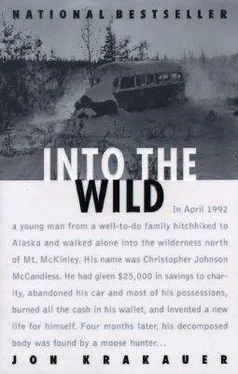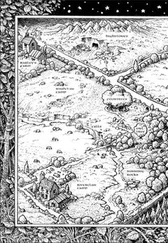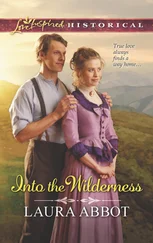With the discovery by Clausen and Treadwell that wild potato seeds may be repositories of swainsonine or some similarly toxic compound, a compelling case can be made for these seeds having caused McCandless s death. If true, it means that McCandless wasn’t quite as reckless or incompetent as he has been made out to be. He didn’t carelessly confuse one species with another. The plant that poisoned him was not known to be toxic-indeed, he’d been safely eating its roots for weeks. In his state of hunger, McCandless simply made the mistake of ingesting its seed pods. A person with a better grasp of botanical principles would probably not have eaten them, but it was an innocent error. It was, however, sufficient to do him in.
The effects of swainsonine poisoning are chronic-the alkaloid rarely kills outright. The toxin does the deed insidiously, indirectly, by inhibiting an enzyme essential to glycoprotein metabolism. It creates a massive vapor lock, as it were, in mammalian fuel lines: The body is prevented from turning what it eats into a source of usable energy. If you ingest too much swainsonine, you are bound to starve, no matter how much food you put into your stomach.
Animals will sometimes recover from swainsonine poisoning after they stop eating locoweed, but only if they are in fairly robust condition to begin with. In order for the toxic compound to be excreted in the urine, it first has to bind with available molecules of glucose or amino acid. A large store of proteins and sugars must be present to mop up the poison and wring it from the body.
“The problem,” says Professor Bryant, “is that if you’re lean and hungry to begin with, you’re obviously not going to have any glucose and protein to spare; so there’s no way to flush the toxin from your system. When a starving mammal ingests an alkaloid-even one as benign as caffeine-it’s going to get hit much harder by it than it normally would because they lack the glucose reserves necessary to excrete the stuff. The alkaloid is simply going to accumulate in the system. If McCandless ate a big slug of these seeds while he was already in a semi-starving condition, it would have been a setup for catastrophe.”
Laid low by the toxic seeds, McCandless discovered that he was suddenly far too weak to hike out and save himself. He was now too weak even to hunt effectively and thus grew weaker still, sliding closer and closer toward starvation. His life was spiraling out of control with awful speed.
There are no journal entries for July 31 or August 1. On August 2, the diary says only, “TERRIBLE WIND.” Autumn was just around the corner. The temperature was dropping, and the days were becoming noticeably shorter: Each rotation of the earth held seven fewer minutes of daylight and seven more of cold and darkness; in the span of a single week, the night grew nearly an hour longer.
“ DAY 100! MADE IT!”he noted jubilantly on August 5, proud of achieving such a significant milestone, “BUT IN WEAKEST CONDITION OF LIFE. DEATH LOOMS AS SERIOUS THREAT. TOO WEAK TO WALK OUT, HAVE LITERALLY BECOME TRAPPED IN THE WILD.-NO GAME.”
If McCandless had possessed a U.S. Geological Survey topographic map, it would have alerted him to the existence of a Park Service cabin on the upper Sushana River, six miles due south of the bus, a distance he might have been able to cover even in his severely weakened state. The cabin, just inside the boundary of De-nali National Park, had been stocked with a small amount of emergency food, bedding, and first-aid supplies for the use of backcountry rangers on their winter patrols. And although they aren’t marked on the map, two miles even closer to the bus are a pair of private cabins-one owned by the well-known Healy dog mushers Will and Linda Forsberg; the other, by an employee of Denali National Park, Steve Carwile-where there should have been some food as well.
McCandless’s apparent salvation, in other words, seemed to be only a three-hour walk upriver. This sad irony was widely noted in the aftermath of his death. But even if he had known about these cabins, they wouldn’t have delivered McCandless from harm: At some point after mid-April, when the last of the cabins was vacated as the spring thaw made dog mushing and snow-machine travel problematic, somebody broke into all three cabins and vandalized them extensively. The food inside was exposed to animals and the weather, ruining it.
The damage wasn’t discovered until late July, when a wildlife biologist named Paul Atkinson made the grueling ten-mile bushwhack over the Outer Range, from the road into Denali National Park to the Park Service shelter. He was shocked and baffled by the mindless destruction that greeted him. “It was obviously not the work of bear,” Atkinson reports. “I’m a bear technician, so I know what bear damage looks like. This looked like somebody had gone at the cabins with a claw hammer and bashed everything in sight. From the size of the fireweed growing up through mattresses that had been tossed outside, it was clear that the vandalism had occurred many weeks earlier.”
“It was completely trashed,” Will Forsberg says of his cabin. “Everything that wasn’t nailed down had been wrecked. All the lamps were broken and most of the windows. The bedding and mattresses had been pulled outside and thrown in a heap, ceiling boards yanked down, fuel cans were punctured, the wood stove was removed-even a big carpet had been hauled out to rot. And all the food was gone. So the cabins wouldn’t have helped Alex much even if he had found them. Or then again, maybe he did.”
Forsberg considers McCandless the prime suspect. He believes McCandless blundered upon the cabins after arriving at the bus during the first week of May, flew into a rage over the intrusion of civilization on his precious wilderness experience, and systematically wrecked the buildings. This theory fails to explain, however, why McCandless didn’t, then, also trash the bus.
Carwile also suspects McCandless. “It’s just intuition,” he explains, “but I get the feeling he was the kind of guy who might want to ‘set the wilderness free.’ Destroying the cabins would be a way of doing that. Or maybe it was his intense dislike of the government: He saw the sign on the Park Service cabin identifying it as such, assumed all three cabins were government property, and decided to strike a blow against Big Brother. That certainly seems within the realm of possibility.”
The authorities, for their part, don’t think McCandless was the vandal. “We really hit a blank on who might have done it,” says Ken Kehrer, chief ranger for Denali National Park. “But Chris McCandless isn’t considered a suspect by the National Park Service.” In fact, there is nothing in McCandless’s journal or photographs to suggest he went anywhere near the cabins. When McCandless ventured beyond the bus in early May, his pictures show that he headed north, downstream along the Sushana, the opposite direction of the cabins. And even if he had somehow chanced upon them, it’s difficult to imagine him destroying the buildings without boasting of the deed in his diary.
There are no entries in McCandless’s journal for August 6, 7, and 8. On August 9, he notes that he shot at a bear but missed. On August 10, he saw a caribou but didn’t get a shot off, and he killed five squirrels. If a sufficient amount of swainsonine had accumulated in his body, however, this windfall of small game would have provided little nourishment. On August 11, he killed and ate one ptarmigan. On August 12, he dragged himself out of the bus to forage for berries, after posting a plea for assistance in the unlikely event that someone would stop by while he was away. Written in meticulous block letters on a page torn from Gogol’s Taras Bulba, it reads:
Читать дальше












